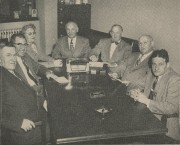State Pharmacy Commission Felix Blanc

I should like to take this opportunity of acquainting you readers briefly with your State Pharmacy Commission and to tell you something about the workings of our Commission which is the direct manifested legal control of the profession of pharmacy in our state towards the betterment and protection of the profession within, and the betterment and protection of the public health of our citizens without.
The Commission of Pharmacy was instituted by the laws of Connecticut in the year 1881 on the first day of June and was then comprised of three members. One commissioner was given a one-year term, another a two-year term, and the third a three-year term, and thereafter, one commissioner was appointed each year by the Governor for a full three-year term. This constituted the composition of the Board until June 1915. At this time, our State Legislature raised the number of commissioners to five, each serving a term of five years, one new member to be appointed each year. Such is the case up to the present. The Commission of Pharmacy today is comprised of five men, who have been for at least a minimum of ten years, registered pharmacists of our State and have been appointed for a term of five years by the Governor who selects one new commissioner each year from an official list of eligible pharmacists.
At the present time your Board of Pharmacy is represented by Bill Harris of Hartford, who is the Chairman; William Dunphy of Waterbury, Ray Mc-Mullen, Moodus; Frank Gross of Glenbrook; and John DeNicola of Hamden.
PHARMACY COMMISSIONERS MEET IN THEIR NEW, MODERN OFFICES IN THE STATE OFFICE BUILDING. .Left to right: Commissioners, William J. Dunphy, Raymond McMullen, Administrative Assistant Marjorie S. Beecher, Commissioner-Secretary William Harris, Director Felix Blanc, Commissioners Frank Gross and John De Nicola.
The purpose of our Board of Pharmacy is to license the personnel who have graduated from a four-year course in an accredited college, by presenting them with an exhaustive and intensive examination concerning both the theoretical and practical phases of pharmacy. Certificates are then granted by the Board to these eligible candidates so that they may practice the profession of pharmacy as licensed registered pharmacists in the
State of Connecticut. It is the duty and function of the Commission to make, devise, construct and enforce all of the laws, statutes, rules and regulations governing the practice of pharmacy; and to regulate the collecting, manufacturing, compounding, handling and dispensing of all substances used in the treatment of disease called medicines; and of all substances which are classified as drugs, chemicals and poisons. The Board also must concern itself with the enforcement of the rules and regulations pertaining to the storing and handling of all narcotics and alcoholic liquors in pharmacies as prescribed by the Bureau of Internal Revenue of the United States Government.
DIRECTOR FELIX BLANC AND CLERICAL STAFF HOLD MONDAY MORNING CONFERENCE. (In the usual order) :
Miss Ann M. McCarthy, Stenographer, Miss Marjorie S. Beechar, Administrative Assistant, Director Blanc, and
Miss Glayds Paine, Stenographer.
To be more specific I might say that included in the duties of the Board are the following:
1. The licensing of personnel as pharmacists.
2. The licensing of stores as registered pharmacies.
3. The formulation of rules and regulations pertaining to the above-mentioned licenses as to their display, renewal and replacement; and the collection of the license fees for the Treasurer of the State.
4. The control of the sale of all anti-biotics, biologicals, antitoxins, vaccines and serums.
5. The control of the sale and storage of poisons, chemicals and narcotics.
6. To control the advertising both of the exterior and interior of all pharmacies, and also the advertising material used by these pharmaceutical businesses in newspapers, the mails and on the airwaves. For example, the sign on the outside of any pharmacy premises, or in or on the windows or door of the premises must clearly indicate the actual ownership of the premises. Another example is the law reading, in part, “no drug retailer shall use advertising whether printed, radio, or display or of any nature which is intentionally inaccurate in any material particular or misrepresents merchandise in respect to its use, trademark, grade, quality, quantity, size, origin, content or preparation and no drug retailer shall use advertising.
Published in 1953
